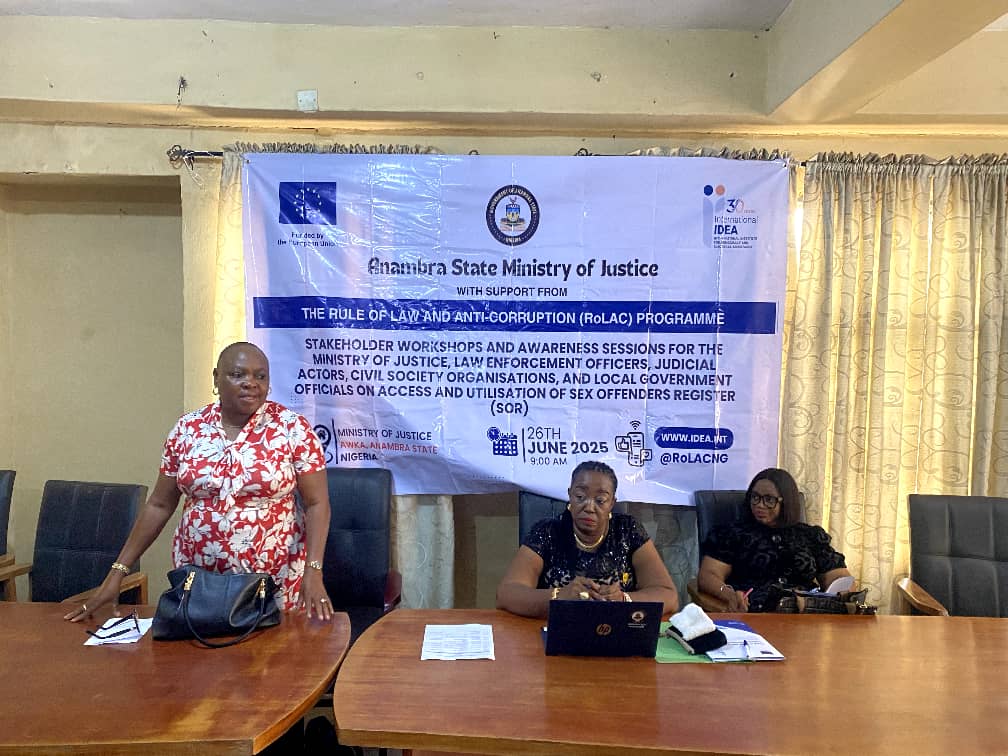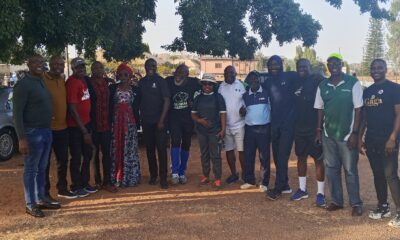By Franklin Ebuka
Sexual and Gender-based violence (SGBV) is a global pandemic that affects 1 in 3 women in their lifetime.
In Nigeria, 30% of women aged 15–49 have experienced physical violence since age of 15; 7% of women in that same age group reported experiencing sexual violence at some point in their lives, while 1 in 4 women (25%) have experienced spousal violence (emotional, physical, or sexual) by their husband or partner. This is according to National Demographic and Health Survey (NDHS) 2018.
In Anambra, the state Police command recorded 38 SGBV cases statewide from January to 21 December 2024. These include emotional, psychological, economic, physical, and sexual violence. However, records from the state ministry of justice show that as at June 26, 2025, there were 76 reported cases of SGBV in the state. These are outside the unreported cases. Giving these unwanted records, there have been National efforts to address sexual violence and abuse.
However, despite these efforts – years of legislation, advocacy, and international funding, Sexual and Gender-Based Violence (SGBV) has continued to surge across Nigeria—leaving survivors traumatized, families broken, and communities scarred.
From metropolitan cities like Abuja and Lagos to rural areas in states across Nigeria, including Anambra state, women, girls, men, and boys continue to face physical, emotional, and sexual abuse—often from those closest to them. Even more disturbing is that the majority of cases go unreported, buried under layers of fear, ignorance, family ties, shame, and societal silence.
This underscores why key principal actors and stakeholders in Anambra have decided to take the fight against SGBV a notch higher.
At an awareness workshop on the existence of Anambra State sexual offenders register, held on Thursday, June 26, 2025 in Awka, these stakeholders concluded that it’s high time more awareness is created on SGBV, with focus on energising multi-sectorial approach to tackling the social problem. They pushed for onboardment of more crusaders and disclosed plans to institutionalise a physical register for sex offenders in the ministry of justice, to complete the digital system and improve accessibility across agencies.
The workshop which assembled key actors from the state ministry of justice, (state Attorney General and commissioner for justice, Director of Public Prosecution, state counsels, etc), Hadis Foundation, media, clergy, security agencies, community based groups, pro bona lawyers, High-Level Multi-Agency Team (HIMAT), Service Providers Accountability Resource committee, (SPARC), data entry personnel and the chief driver/partner, Rule of Law and Anti-Corruption (RoLAC) Programme, was an opportunity to review the synergistic fight against SGBV in the state, vis-a-vis case reporting, data collection and documentation by the ministry of Justice, prosecution successes, challenges and the road ahead.
It also afforded an opportunity for all stakeholders to recommit to the fight against Sexual and Gender-Based Violence, which is more than a social issue; but also a public health emergency, a human rights violation, and a barrier to sustainable development.
In her address, the Anambra State Attorney General and Commissioner of Justice, Professor Silvia Ifemeje, noted that through the support of their strategic partners — especially the Hadis Foundation and its sponsor, the Rule of Law and Anti-Corruption (RoLAC) Programme, the state has made some commendable strides in prosecuting SGBV cases effectively.
The Attorney General, who was represented by the Solicitor General and Permanent Secretary, Barrister
Ngozi Iwuno, mni said their invaluable supports have been instrumental in the successes recorded.
Iwuno said, “We begin by acknowledging the immense support of our partners — especially the Hadis Foundation and its sponsor, the Rule of Law and Anti-Corruption (RoLAC) Programme — for their strategic partnership, capacity support, and unwavering dedication to the SGBV response architecture in Anambra State”.
“Today, I am pleased to report that Anambra State has made commendable strides in prosecuting SGBV cases effectively. From the last quarter’s report of 47 recorded offenders, 11 convictions, and 12 ongoing cases, we now record 76 offenders, 13 convictions, and 31 ongoing cases for the current quarter. These figures represent not just statistics, but milestones on our collective journey toward justice and accountability”, she added.
The attorney General attributed the prosecutorial successes to a number of factors, which include, the setting up of Specialized SGBV Prosecution Unit by the Directorate of Public Prosecutions (DPP), staffed with 10 prosecutors trained to handle only SGBV matters; strengthened Data Collection and Reporting Systems; the designation of specialized courts — both at the High Court and Magistracy levels — to handle exclusively SGBV cases; operationalisation of the VAPP Law, 2017 and Robust`Multi-Agency Coordination.
She however noted that inadequate funding for the Ministry of Justice and allied agencies, limited number of State Counsels willing to specialize in SGBV cases due to a lack of adequate incentives and emotional toll and poor working conditions for data and support staff, still pose a challenge.
In spite of these challenges the Commissioner of Justice stated that the state government remains unshaken in its commitment to the fight against SGBV. She disclosed that the state is in the process of institutionalizing a physical register for sex offenders at the Ministry to complement the digital system and improve accessibility across agencies.
She urged every stakeholder from the bench, the bar, the police, the health sector, or civil society to build on the gains recorded by expanding sensitization of the Sexual Offenders Register across communities, strengthening institutional coordination and survivor support and investing in the human and financial resources required to sustain these successes.
The Sexual Offender Register, managed by the National Agency for the Prohibition of Trafficking in Persons (NAPTIP) is only accessible online currently. The register serves as a tool to document and track cases of sexual violence and abuse, including those reported, arraigned, or convicted under the Violence Against Persons Prohibition (VAPP) Act. The register includes information on convicted offenders, as well as those who have been arraigned or reported, with varying levels of access depending on the user and the nature of the information.
Earlier, in her opening remark, the coordinator of RoLAC programme in Anambra state, Josephine Onah harped on the need for sustained multi-agency collaboration in the areas of sensitisation on SGBV, sex offenders register and availability of support service, data collection and reporting, survivors and family support, as well as. Onah, who regretted that perpetrators of Gender Based violence have continued to exploit societal lapses to perpetuate their evil, stressed that the offenders need to be named and shamed. She called on all the stakeholders to step up action towards eradicating the social scourge.
On her part the Anambra state coordinator of Service Providers Accountability Resource Committee (SPARC) and Director of Davina Care Foundation, Yohanna Rachel, who lamented the lack of support from some key stakeholders like the church, noted that a synergistic collaboration, logistics supports and cooperation of victims families will help close the gaps in the fight against gender based violence.
It’s important to note that Anambra state provides enhanced services: a specialized reporting system, counselling and medical support, sexual assault referral centres (SARCs), and a new family court to expedite legal processes. The Ntasi Centre (sexual assault referral centre) at Enugu‑Ukwu General Hospital launched in 2019 to provide medical/forensic support to sexual assault survivors.
Sexual and gender-based violence (SGBV) is an umbrella term for harmful acts of abuse committed against a person because of his or her sex or gender. It is forcing another person to do something against his or her will through violence, coercion, threats, deception, cultural expectations, or economic means.
The Rule of Law and Anti-Corruption (RoLAC) Programme Phase II” is funded by the European Union and implemented by International IDEA. The overall goal is to contribute to the consolidation of the rule of law and anti-corruption reforms in Nigeria.
The time to break the silence is now. In the words of Iwuno, “Together, let us move from commitment to consistency, from awareness to action, and from silence to justice”.

 NEWS2 years ago
NEWS2 years ago
 MUSIC4 years ago
MUSIC4 years ago
 MUSIC4 years ago
MUSIC4 years ago
 MUSIC2 years ago
MUSIC2 years ago
















